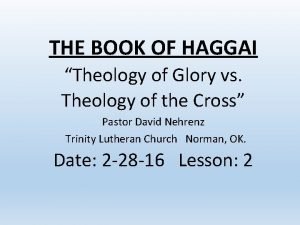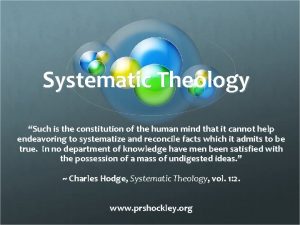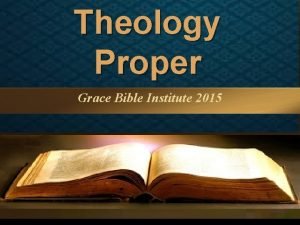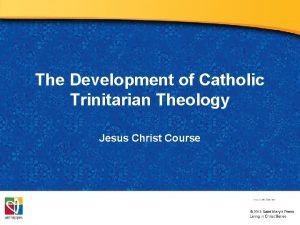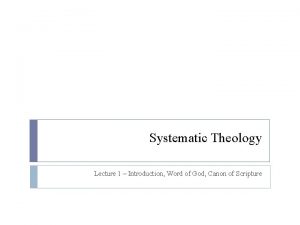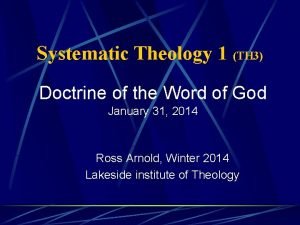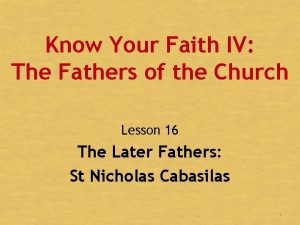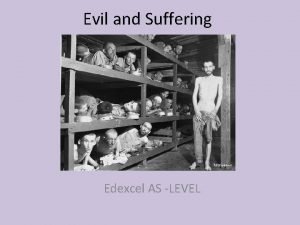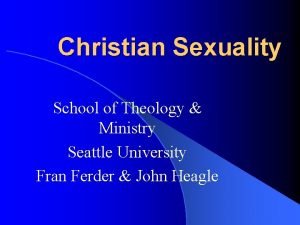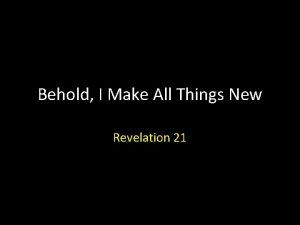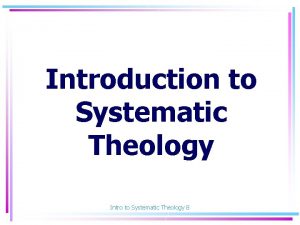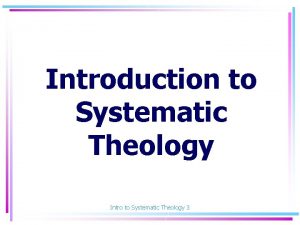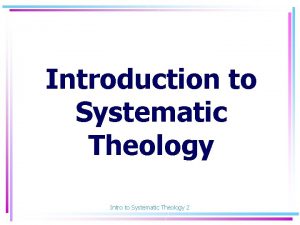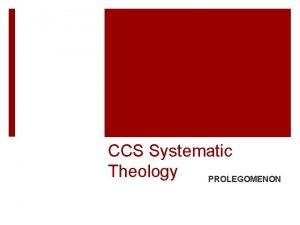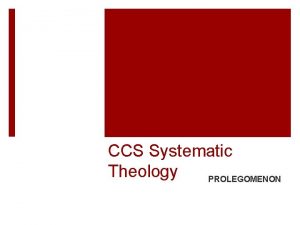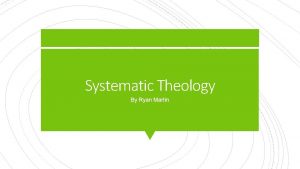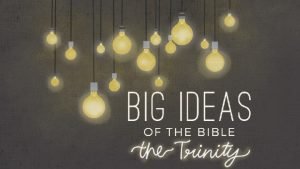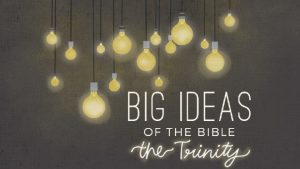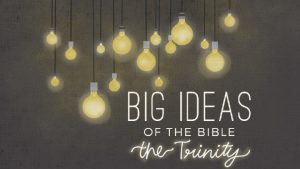Introduction to Systematic Theology Intro to Systematic Theology











- Slides: 11

Introduction to Systematic Theology Intro to Systematic Theology 7

NARRATIVE THEOLOGY – According to William Placher’s summary, Narrative Theology has three major characteristics. (As quoted by Mc. Grath, “Evaluation, ” 23 -4). • “The primacy of narrative as an interpretative category for the Bible • The hermeneutical primacy of the world created by the biblical narratives over the world of human experience • The primacy of language over experience” 1/10/2022 Intro to Systematic Theology 7 2

NARRATIVE THEOLOGY • Lindbeck’s Typology seeks to divide “theological theories of religion and doctrine. . . into three types. ” The Nature of Doctrine, 16. – Cognitive/Propositionalist, or the Traditional Way, which emphasizes cognitive aspects, truth as captured in propositions – Experiential/Expressive, or Expressively Symbolic, which focuses on feelings, attitudes, experience- not propositions – Hybrid, combines above two methods listed above; replaced by the – Cultural Linguistic or Regulative approach which emphasizes the role of the community in the formation of rules and church doctrine 1/10/2022 Intro to Systematic Theology 7 3

NARRATIVE THEOLOGY • The Cognitive-Propositionalist: This type “emphasizes the cognitive aspects of religion and stresses the ways in which church doctrines function as informative propositions or truth claims about objective realities. ” NOD, 16. – Treats religion “as similar to philosophy” – “The approach of traditional orthodoxies” – “If a doctrine is once true, it is always true” – Representative theologians: Charles Hodge, Wayne Grudem 1/10/2022 Intro to Systematic Theology 7 4

NARRATIVE THEOLOGY • The Experiential-Expressivist: Type “interprets doctrines as noninformative and nondiscursive symbols of inner feelings, attitudes, or existential orientations. ” NOD, 16 – “Highlights the resemblances of religions to aesthetics enterprises” – “Particularly congenial to the liberal theologies influenced by. . . Schleiermacher” – “Insofar as doctrines function as nondiscursive symbols, they are polyvalent in import and therefore subject to changes or meaning or even to a total loss of meaningfulness” – Representative Theologians: F. D. W. Schleiermacher, Paul Tillich 1/10/2022 Intro to Systematic Theology 7 5

NARRATIVE THEOLOGY • The Hybrid: This type makes use of “both cognitivist and experiential-expressive perspectives. ” – “Equipped to account more fully than can the first two types for both variable and invariable aspects of religious traditions” – “They resort to complicated intellectual gymnastics and to that extent are unpersuasive” – Representative Theologians: Karl Rahner, Bernard Lonergan 1/10/2022 Intro to Systematic Theology 7 6

NARRATIVE THEOLOGY • The “Cultural-Linguistic” or “regulative” approach – “The function of church doctrines that becomes most prominent in this perspective is their use, not as expressive symbols or as truth claims, but as communally authoritative rules of discourse, attitude, and action. This general way of conceptualizing religion will be called in what follows a ‘cultural -linguistic’ approach, and the implied view of church doctrine will be referred to as a ‘regulative’ or ‘rule’ theory. ” NOD, 18 1/10/2022 Intro to Systematic Theology 7 7

NARRATIVE THEOLOGY – “Rules, unlike propositions or expressive symbols, retain an invariant meaning under changing conditions of compatibility and conflict. For example, the rules ‘Drive on the left’ and ‘Drive on the right’ are unequivocal in meaning and unequivocally opposed, yet both may be biding: one in Britain and the other in the United States, . . . ” NOD, 18 1/10/2022 Intro to Systematic Theology 7 8

NARRATIVE THEOLOGY – “This stress on the code, rather than the (e. g. propositionally) encoded, enables a culturallinguistic approach to accommodate the experiential concern for the unreflective dimensions of human existence far better that is possible in a cognitivist outlook. Religion cannot be pictured in the cognitivist (and voluntarist) manner as primarily a matter of deliberately choosing to believe or follow explicitly known propositions or directives. Rather, to become religious- no less than to become culturally or linguistically competent- is to interiorize a set of skills by practice and training. ” NOD, 35 1/10/2022 Intro to Systematic Theology 7 9

NARRATIVE THEOLOGY – “In the Christian case the system is constituted, not in purely intellectual terms by axioms, definitions, and corollaries, but by a set of stories used in specifiable ways to interpret and live in the world. The mistake of a primarily cognitive-propositional theory of religion, from a cultural-linguistic perspective, is to overlook this difference. ” NOD, 64. 1/10/2022 Intro to Systematic Theology 7 10

Introduction to Systematic Theology Intro to Systematic Theology 7
 Theology of glory vs theology of the cross
Theology of glory vs theology of the cross Elenctic theology definition
Elenctic theology definition Define theology proper
Define theology proper Theology proper definition
Theology proper definition Antony flew falsification
Antony flew falsification The development of catholic trinitarian theology
The development of catholic trinitarian theology Theology proper lecture notes
Theology proper lecture notes What is theology
What is theology Palamite theology
Palamite theology Process theology
Process theology Seattle university school of theology and ministry
Seattle university school of theology and ministry Jon courson theology
Jon courson theology
